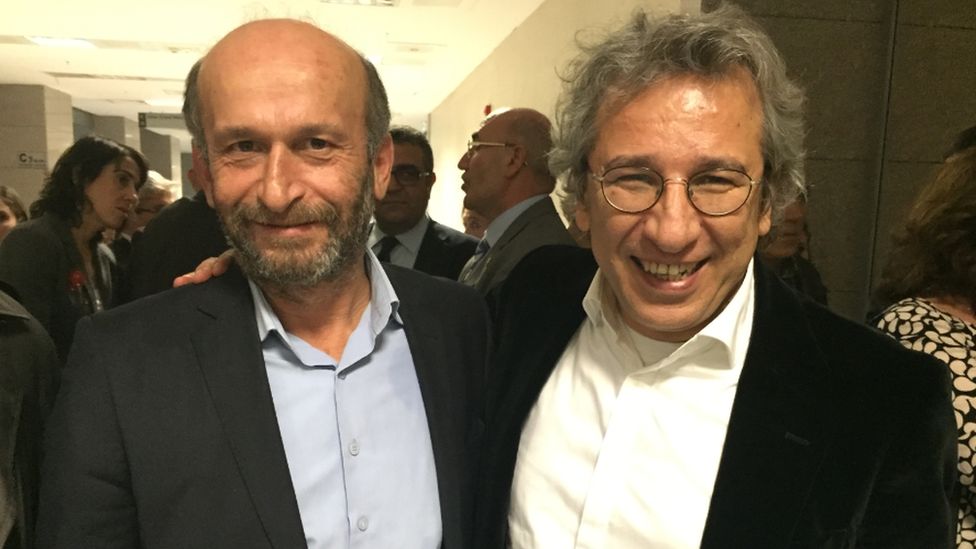Turkey jails Cumhuriyet journalists Can Dundar and Erdem Gul
- Published

A Turkish court has jailed two prominent journalists for revealing state secrets, in a case widely criticised by international observers.
Erdem Gul received five years and Can Dundar five years and 10 months.
Mr Dundar and Mr Gul, editor and Ankara bureau chief of opposition daily Cumhuriyet, had reported that Turkey had tried to ship arms to rebels fighting the Syrian government.
Shortly before the verdict, a gunman attempted to kill Mr Dundar.
The assailant fired several shots while Mr Dundar was briefing reporters outside the courthouse. Mr Dundar escaped unharmed and the gunman was arrested. A reporter was lightly injured in the leg.
Speaking after the verdict, Mr Dundar said the sentence, and the assassination attempt, were "not given only to suppress and silence us" but to "intimidate the Turkish media and make us scared of writing".
Journalist Can Dundar's wife Dilek and an unnamed man initially restrained the gunman
The two men were acquitted of more serious charge of espionage, which could have carried with it a life sentence. But their very prosecution has proved controversial, drawing sharp criticism from human rights campaigners and fellow journalists.
The two men are expected to appeal against the verdicts.
John Dalhuisen, Europe and Central Asia Director for Amnesty International, called the convictions a "travesty of justice".
He said: "The decision, which punishes good journalism with five years' imprisonment, shows how the law has buckled and broken under political pressure in Turkey."
Mr Dundar and Mr Gul were charged in November with espionage after their reports in May 2015 alleging that Turkey's intelligence services were sending weapons and ammunition to Islamist rebels fighting the government of Syrian President Bashar al-Assad.
Turkish security forces intercepted a convoy of lorries near the Syrian border in January 2014, and Cumhuriyet alleged these vehicles were linked to Turkey's MIT intelligence organisation.
Alongside the newspaper report was video footage showing police discovering crates of weapons hidden beneath boxes of medicine.
The Turkish government insisted that the lorries were not carrying weapons to the Islamist rebels as alleged, but bringing aid to Syria's Turkmen minority, a Turkic-speaking ethnic group.
President Recep Tayyip Erdogan said that the video footage was a state secret, and by publishing it Cumhuriyet daily had engaged in an act of espionage.
"Whoever wrote this story will pay a heavy price for this. I will not let him go unpunished," he vowed live on television.
Referring to Mr Erdogan, Mr Dundar said: "Today, we know that the reason for the threats we have been receiving for weeks and the bullets fired from that gun today are due to the fact that we have been shown as targets by the highest office in the state."
The journalists have become a symbol of the erosion of press freedom in Turkey, says the BBC's Mark Lowen in Istanbul.
Media freedom has plummeted in Turkey, which now ranks 151st of 180 countries in an index by the watchdog Reporters without Borders.
Freedom of the press in Turkey
- Turkey ranks 151st amongst the 180 countries in the Reporters Without Borders' World Press Freedom Index 2016
- Media organisations in Turkey say that more than 30 journalists are currently behind bars
- Most are of Kurdish origin
- The government argues journalism in Turkey is among the most free in the world